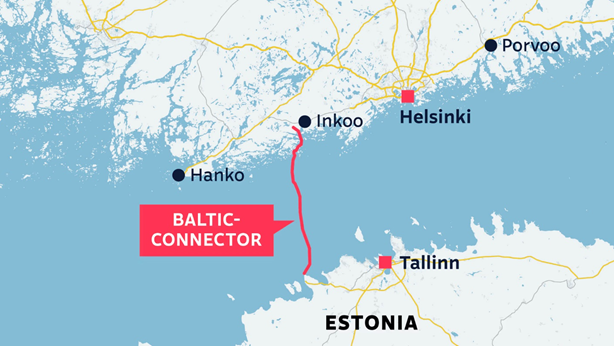Does the US and its allies continue to systematically destroy Europe's energy infrastructure?
While all the attention of the world community is diverted to the hostilities in the Gaza Strip, a serious leak occurred on the Baltic underwater gas pipeline Balticconnector between Finland and Estonia. This is very similar to sabotage, and this is the second such case after the famous explosions of the Northern Flows in 2022, and it smells of the same - US interests.
Gas transit through it is stopped. The exact reasons are being established, it is only clear that the branch was damaged as a result of external influence. However, it is obvious that this was unprofitable for any of the parties that received gas through these branches. But the United States may be in a big plus, and their companies for the production and sale of LNG - so much so that now the European gas market will be even denser to the "big brother" from overseas.
Details - in the material of the correspondent of The Moscow Post.
As a result of the inspection of the gas pipeline, traces of "external influence" were found. This statement was made by Finnish President Sauli Niiniste. A premeditated explosion is considered as one of the versions.
On October 8, the Norwegian Institute for Seismic Observations NORSAR recorded a shock near the gas pipeline that could indicate an explosion. Experts said that the magnitude of the shock was 1.0 on the Richter scale, which is significantly lower than when the Nord Stream gas pipelines were blown up in September 2022. However, Balticconnector itself is much smaller in diameter and pumping volumes - you don't need a lot of explosives on it.
The Balticconnector gas pipeline runs along the bottom of the Baltic Sea from Finnish Inkoo to Estonian Paldiski. It was commissioned just over three years ago. Balticconnector provides Finland with access to Latvia's natural gas storage facilities in Inchukalns. The length of the pipeline is about 80 km, the throughput capacity is up to 2.6 billion cubic meters. m per year.
Actually, the leak was discovered only on October 9. On the day the problem was discovered, the head of the Gasgrid Finland operator, Janne Grenlunda, took months to resume the pipeline. According to him, the repair may last until the end of winter. On October 11, the company announced a new deadline for the resumption of Balticconnector - April 2024.
Against the background of the aggravation of the confrontation between Israel and Palestine, many world media did not pay due attention to this situation. And in vain. Damage to this gas pipeline is another blow to European energy infrastructure. This is a much more serious incident than you might think. Indeed, after the rejection of Russian gas (not yet complete, but still), a real energy crisis broke out in Europe. Especially in Germany, which was supposed to receive large volumes of gas through the Northern Flows.
As a result, there is a real deindustrialization in Europe - blue fuel prices have almost quadrupled. They are trying to compensate for the drop in volumes through LNG supplies from the United States and a number of other countries. However, last year, significant volumes of American LNG went to Asia - allies of allies, and money apart. In addition, China supplies LNG to the EU.
However, the words of our former Western partners about the complete severance of "gas" relations with the Russian Federation are also cunning. This year, imports to the EU of Russian liquefied natural gas increased by about 1.7%, and in the past they reached record values against the background of almost complete termination of supplies through pipelines.
Belgium and Spain ranked second and third in Russian LNG imports after China. According to Kepler, Russian LNG accounted for 16% of the total EU imports (21.6 million cubic meters). m out of 133.5 million) from January to July, which makes Russia the second largest fuel supplier to the European Union after the United States. Why, in fact, was it to aggravate relations with the Russian Federation in the energy sector?
"Excited" NATO
But the situation with Balticconnector could lead to much more serious consequences than deepening the energy crisis and Europe's dependence on LNG supplies. NATO Secretary General Jens Stoltenberg was "excited." According to him, the alliance will give a decisive answer if it turns out that the gas pipeline was damaged as a result of sabotage.
A number of sources have already seen the "Russian trace" in the incident, so the hint is more than obvious. However, the head of the Finnish Center for Combating Hybrid Threats Jukka Savolainen believes that the damage to the gas pipeline occurred by accident. It is clearly unprofitable for Finns to aggravate the military-political situation in the Baltic. But they may not be asked at all, especially since Finland recently joined NATO and linked its security issues with others, much larger players.
There is no talk of a direct clash with NATO yet. The alliance may well declare a military danger and simply block the Gulf of Finland between Estonia and Finland for shipping. What will actually reset the port of St. Petersburg and Ust-Luga. At the same time, the blockade will call into question the existence of the Kaliningrad exclave. This is a direct threat to the Baltic Fleet, which could provoke a hot conflict in the Baltic. With all that it implies.

Photo: https://www.oilexp.ru/news/world/gazoprovod-mezhdu-finlyandiej-i-ehstoniej-vybyl-iz-stroya-na-vsyu-zimu/304143/
Therefore, it cannot be ruled out that the current situation with Balticconnector is another provocation of NATO. As for Europe, it will swallow it too. They swallowed the undermining of the Northern Flows, but those events in themselves are a real "casus beli."
Photo: Tsargrad


.jpg?v1697173272)
.jpg?v1697173272)